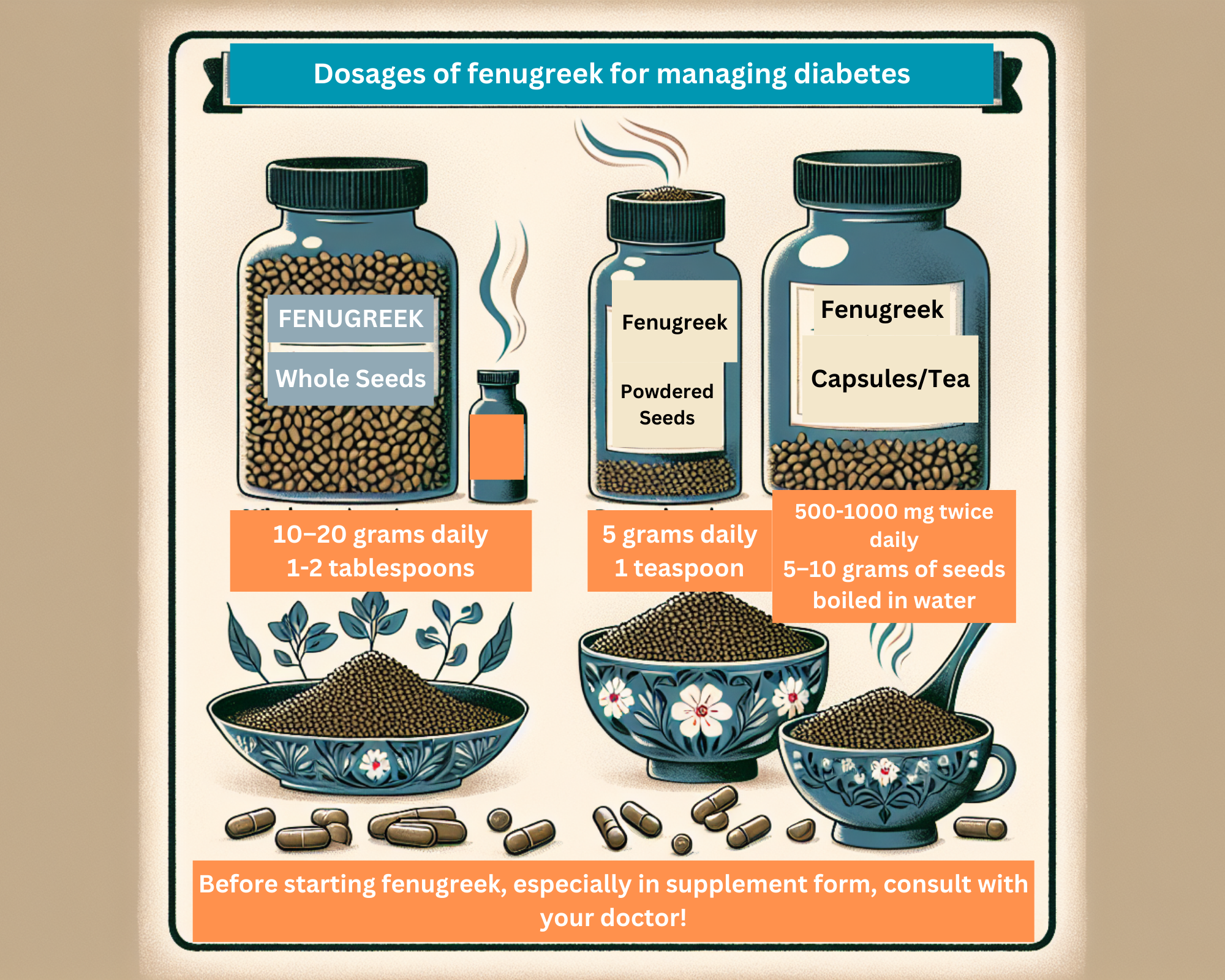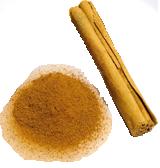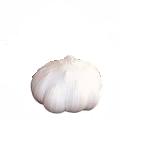How To Use Fenugreek For Diabetes Control?
- Home
- Natural Remedies
- Use Fenugreek for Diabetes Control
Fenugreek is a medicinal herb that has shown promise for diabetes control.
Its seeds are rich in soluble fiber, which helps lower blood sugar levels by slowing carbohydrate digestion and absorption.
This natural remedy offers a complementary approach to traditional diabetes treatments, supporting overall blood sugar control.
What is Fenugreek?

Fenugreek is an herb native to the Mediterranean region, southern Europe, and western Asia. Its scientific name is Trigonella foenum-graecum.
The plant has small, round leaves and produces long, slender pods containing seeds that are commonly used in cooking and traditional medicine. Fenugreek seeds and leaves have a distinctive, slightly bitter taste and a strong aroma.
Fenugreek seeds and leaves are used as a spice and herb in various cuisines, particularly in Indian, Middle Eastern, and North African dishes. The seeds are often toasted to reduce their bitterness and add a nutty flavor to dishes.
Its seeds are rich in fiber, protein, iron, magnesium, and manganese. They also contain various bioactive compounds, such as saponins, flavonoids, and alkaloids such as gentianine, trigonelline, and carpaine.
Fenugreek has been traditionally used to treat a variety of ailments, including digestive issues, inflammation, and respiratory problems. It is also known for its potential to help manage blood sugar levels and improve cholesterol profiles.
In addition, it is believed to aid in diabetes management by slowing carbohydrate digestion and absorption, thereby helping to regulate blood sugar levels due to its component, fenugreekine. It may also have anti-inflammatory, antioxidant, and appetite-suppressing effects.
How can Fenugreek help with diabetes control?

Fenugreek helps with diabetes primarily through its effects on blood sugar regulation.
Below, I will try to explain how Fenugreek helps manage diabetes:
1. It contains a high amount of soluble fiber. This type of fiber forms a viscous gel in the intestines, thus slowing down the digestion and absorption of carbohydrates in the intestines. This leads to a slower and more gradual increase in blood sugar levels after meals, helping to prevent spikes.
Furthermore, this type of fiber slows down the emptying of the stomach, which can also help maintain steadier blood sugar levels over time and prevent postprandial (after-meal) spikes.
2. Some studies suggest that fenugreek can improve insulin sensitivity, making the body's cells more responsive to insulin. This helps in better glucose uptake from the blood, thereby lowering blood sugar levels. This is due to its component, 4-hydroxyisoleucine.
3. Fenugreek has compounds (amino acids) that may help stimulate insulin secretion from the pancreas. Increased insulin production helps in better regulation of blood sugar levels by promoting the uptake of glucose into cells.
5. Fenugreek contains compounds like β-amylase, which have been shown to reduce the absorption of sugars in the intestines, thereby lowering blood sugar levels.
6. The antioxidant properties of fenugreek help reduce oxidative stress, which is often higher in individuals with diabetes. Lower oxidative stress can improve overall metabolic health and blood sugar control.
How do I use Fenugreek for diabetes control?

Fenugreek can be consumed in various forms for diabetes management, including the following:
Whole Seeds
Soaked Seeds: Soak 1-2 tablespoons of fenugreek seeds in a glass of water overnight.
Drink the water along with the seeds on an empty stomach in the morning. This can help regulate blood sugar levels throughout the day.
Sprouted Seeds:
Soak fenugreek seeds in water for 24 hours, then drain and leave them to sprout in a damp cloth for another day or two. Add the sprouted seeds to salads, sandwiches, or as a garnish for various dishes.
Fenugreek Powder
Powdered Seeds: Grind fenugreek seeds into a fine powder using a spice grinder or purchase fenugreek powder from a store. Mix 1 teaspoon of fenugreek powder with water, milk, or yogurt. Alternatively, sprinkle it over foods such as oatmeal, soups, or smoothies.
Capsules and Supplements:
Fenugreek powder is also available in capsule form. Follow the dosage instructions provided on the packaging or consult your caring doctor for personalized advice.
Fenugreek Tea
Boil 2 teaspoons of fenugreek seeds in a cup of water for about 5–10 minutes. Strain the seeds and drink the tea. Drink fenugreek tea once or twice daily to help manage blood sugar levels.
Fenugreek Leaves
Fresh fenugreek leaves can be used in cooking, such as in curries, soups, and stews. They can also be added to salads and smoothies.
Dried fenugreek leaves, known as "kasuri methi," can be crushed and added to various dishes for flavor and potential health benefits.
What are the dosages for fenugreek to effectively manage diabetes?

The effective dosage of fenugreek for managing diabetes can vary depending on the form in which it is consumed.
Generally speaking, the doses of the respective forms are as follows:
Whole Seeds: 10–20 grams daily (1-2 tablespoons)
Powdered Seeds: 5 grams daily (1 teaspoon), up to twice daily if needed
Capsules: 500–1000 mg, taken twice daily
Fenugreek Tea: 5–10 grams of seeds boiled in water, once or twice daily
Apart from the right dosage, regular and consistent consumption of fenugreek is essential to achieving the best results in blood sugar control.
Drink plenty of water throughout the day, especially when consuming fenugreek seeds, as they are high in fiber and can absorb water.
Regularly monitor your blood sugar levels to track the effects of fenugreek and make any necessary adjustments to your diet or medication.
Before starting fenugreek, especially in supplement form, consult with your doctor, particularly if you are taking medications for diabetes or other conditions.
How long does it take to see the effects of fenugreek on blood sugar levels?
The time it takes to see the effects of fenugreek on blood sugar levels can vary based on individual factors, dosage, and consistency of use. Generally, it may take a few weeks to a few months to observe significant changes in blood sugar levels.
Factors that can influence this timeline include:
- Higher dosages or more potent forms (such as concentrated extracts) may produce noticeable effects more quickly than lower dosages or whole seeds.
- Regular, consistent consumption is crucial for achieving and maintaining blood sugar control. Sporadic use may not yield significant results.
- Individual differences in metabolism, overall health, and severity of diabetes can affect how quickly Fenugreek impacts blood sugar levels.
- A balanced diet, regular physical activity, and adherence to other diabetes management strategies can enhance the effects of fenugreek.
So, as per the timeline:
Some individuals may notice a reduction in postprandial (after meal) blood sugar levels within a few hours to a few days of starting fenugreek, especially when consumed before meals.
Within 2-4 weeks, more consistent improvements in fasting blood glucose levels and overall blood sugar control may be observed. This period allows the body to adjust to the regular intake of fenugreek.
Significant changes in HbA1c (a measure of long-term blood sugar control) may take 2–3 months to become apparent. HbA1c reflects average blood sugar levels over the past 2-3 months, so sustained use of fenugreek is necessary to see improvements in this measure.
Are there any scientific studies supporting Fenugreek's efficacy for diabetes?
Yes, there are some scientific studies supporting the efficacy of fenugreek in managing diabetes.
Here are some key findings from various research studies:
- Patients with type 2 diabetes participated in a study that Sharma RD, et al. conducted and published in the European Journal of Clinical Nutrition in 1990. At the end, it was concluded that consuming 15 grams of fenugreek powder soaked in water daily for 24 weeks significantly reduced fasting blood glucose levels and improved glucose tolerance.
- There is a large systematic review study regarding the effect of fenugreek on both type 1 and type 2 diabetes. It was Published online 2023 Sep September 12 in Int J Mol Sci
- Another study demonstrated that patients with type 2 diabetes who took 1 g of fenugreek seed extract daily for 60 days experienced a significant reduction in fasting blood glucose levels and HbA1c. Gupta A. et al. carried out this study, which they then published in Nutrition Research Findings in 2001.
- In another study by Neelakantan N. et al., it was found that fenugreek seed extract reduced postprandial blood sugar levels in type 2 diabetics by delaying digestion and absorption. This study was published in 2009 in the International Journal for Vitamin and Nutrition Research.
- In vitro studies include the one on antidiabetic properties of Fenugreek, confirming that fenugreek seeds have antidiabetic properties, as they significantly lowered blood glucose levels in diabetic mice and improved their lipid profiles.
- Meanwhile, Broca et al., identified 4-hydroxyisoleucinea compound in fenugreek that enhances insulin secretion and improves glucose tolerance in both animal and human models.
- In another study on type 2 diabetics, issued in Nutrition Research in 1998, 25 grams of powdered fenugreek seed were given twice a day in addition to the medication therapy. The result was a decrease in average fasting glucose from 151 mg/dl to 112 mg/dl. Also, the glucose levels two hours after the meal decreased, along with the average A1C, from 9.6% to 8.4% after 8 weeks.
What are the potential side effects of using Fenugreek?

While fenugreek is generally considered safe for most people when used in moderation, there are some potential side effects and precautions to be aware of. I will try to explain them as follows:
Digestive Issues
Bloating and Gas: Fenugreek’s high fiber content can cause bloating, gas, and discomfort, especially when consumed in large amounts.
Diarrhea: Excessive intake may lead to diarrhea and gastrointestinal upset.
Nausea: Some individuals might experience nausea or stomach discomfort.
Allergic Reactions
Although rare, allergic reactions to fenugreek can occur. Symptoms may include rash, hives, swelling, difficulty breathing, and wheezing.
Precaution: If you have a known allergy to peanuts, chickpeas, or other legumes, be cautious as cross-reactivity can occur.
Hypoglycemia
Fenugreek can lower blood sugar levels, which might lead to hypoglycemia (especially in individuals already taking diabetes medications).
Regular monitoring of blood sugar levels is essential, and dosage adjustments for diabetes medications may be necessary under medical supervision.
Interactions with Medications
- Anticoagulants: Fenugreek can enhance the effects of blood-thinning medications (e.g., warfarin), increasing the risk of bleeding.
- Diabetes Medications: It can interact with other diabetes medications, potentially causing blood sugar levels to drop too low.
- Precaution: Always consult with your caring doctor/nurse before starting fenugreek if you are on any medications.
Pregnancy and Breastfeeding
Pregnancy: High doses of fenugreek can stimulate uterine contractions, potentially leading to preterm labor. Unless specifically advised to do so by your caring doctor/nurse, it is best to avoid fenugreek during pregnancy.
Breastfeeding: Fenugreek is commonly used to increase milk production, but excessive use can cause gastrointestinal issues in both the mother and the baby.
Maple Syrup Odor
Body and Urine Odor: Consuming fenugreek can cause a noticeable maple syrup-like odor in sweat and urine, which is harmless but might be unpleasant for some individuals.
Potential for Toxicity
Excessive Use: Very high doses of fenugreek can lead to toxicity and should be avoided. Always stick to recommended dosages.
Taking all the above potential side effects into account, it is highly recommended to:
- Begin with a small dose and gradually increase it to allow your body to adjust.
- Drink plenty of water to help manage the high fiber content.
- Keep track of any side effects and report them to your healthcare provider.
- Speak with your caring doctor/nurse before starting fenugreek, especially if you have underlying health conditions or are taking medications
|
Written by Dr.Albana Greca Sejdini, Md, MMedSc Medically reviewed by Dr.Ruden Cakoni, MD, Endocrinologist |
Last reviewed 7/5/2024 |
Explore more herbs.
Diabetes complications Questions or Problems? Get Help Here
This is the place where you can ask a question about any aspect of diabetes complications.
It's free and it's easy to do. Just fill in the form below, then click on "Submit Your Question".














